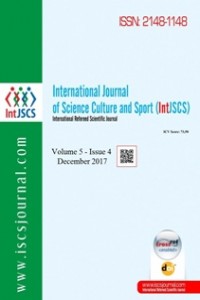Investigation of the Mental Endurance Levels of the Athletes Participating in the Table Tennis Championship of Universities in Turkey
Öz
The
purpose of this study was to investigate the mental endurance of the athletes
who participated in the table tennis championship inter Universities in Turkey.
To investigate the mental endurance of the athletes who participated in the
study, the mental endurance rubric whose validity and reliability work has been
done by Erdoğan (2016) was used. Also, some questions including some personal
data of the subjects were also included in the inventory. For statistical
tests, The Saphiro-Wilks test was performed to determine if the data had a
normal distribution. Due to data not having a normal range, non-parametric
tests such as Mann-Whitney U test and Kruskal-Wallis test were applied.
According to the results of the analysis, it has been seen that there is no
meaningful difference between the mental endurance score of the athletes based
on categories such as; age, sex, playing sports year, and playing sports under
a license. Results showed that the male athletes (57,79±6,676) have a higher
average of mental endurance compared to female athletes (46,82±6,525), the
athletes with higher playing sports year, 13-15 years, (50,87±6,329)compared to
lower playing sports years, 7-9 years, (57,13±7,731) have a lower average of
mental endurance, athletes who play in the unileage (56,18±7,795) have a higher
average of mental endurance compared to the athletes who play in 1.,2.,3.
Leagues (51,48±5,714) and athletes who play in other leagues or athletes who
don't play in any leagues ((50,98±4,415) and athletes aged 21-23 (54,88±7,142)
has a higher average of mental endurance compared to ages 18-20 (53,38±6,260),
ages 24-26 (53,06±6,752).
Anahtar Kelimeler
Kaynakça
- Altıntaş A (2015). “Sporcuların Zihinsel Dayanıklılıklarının Belirlenmesinde Optimal Performans Duygu Durumu, Güdülenme Düzeyi ve Hedef Yöneliminin Rolü.” Doktora Tezi. Ankara Üniversitesi Sağlık Bilimleri Enstitüsü.
- Clough P, Earle K, Sewell D (2002). Mental Toughness: The Concept and Its Measurement. In Cockerill I, Solutions in Sport Psychology. 1st ed. London: Thomson.
- Crust L, Swann C (2011). “Comparing Two Measures of Mental Toughness.” Personality and Individual Differences 50: 217-221.
- Durand B, Natalie S, John H (2002). “The Development And Maintenance of Expert Athletic Performance: Perceptions of World and Olympic Champions.” Journal of Applied Sport Psychology 143: 154-171.
- Ercan Y, Hülya Y (2013). Spor ve Egzersiz Psikolojisi, 2. Baskı, Ankara: Nobel Yayıncılık.
- Gucciardi G, Daniel F (2010). “Mental Toughness Profiles and Their Relations with Achievement Goals and Sport Motivation in Adolescent Australian Footballers.” Journal of Sports Sciences 286: 615-625.
- Henman T, Rusedki G (1996). Coaching Excellence, Mental Toughness Question and Answered. 13 p.3.
- Jones G, Hanton S, Connaughton D (2002). What is Thirsting Called Mental Toughness? An Investigation of Elite Sport Performers. Journal of Applied Sport Psychology 14:205–218. Doi:10.1080/10413200290103509.
- Loehr J, James E (1986). Mental Toughness Training For Sports: Thestephen Green Press. Penguin Books.
- Weinberg RS, Butt J, Culp B (2011). “Coaches’ Views of Mental Toughness and How it is Built” International Journal of Sportand Exercise Psychology.” 9:156–172. Doi:10.1080/1612197x.2011.567106.
- Weinberg RS, Gould D (2015). Spor ve Egzersiz Psikolojisinin Temelleri, M. Şahin ve Z. Koruç tarafından 6.Basımdan Çeviri. Ankara: Nobel Yayıncılık.
Öz
Kaynakça
- Altıntaş A (2015). “Sporcuların Zihinsel Dayanıklılıklarının Belirlenmesinde Optimal Performans Duygu Durumu, Güdülenme Düzeyi ve Hedef Yöneliminin Rolü.” Doktora Tezi. Ankara Üniversitesi Sağlık Bilimleri Enstitüsü.
- Clough P, Earle K, Sewell D (2002). Mental Toughness: The Concept and Its Measurement. In Cockerill I, Solutions in Sport Psychology. 1st ed. London: Thomson.
- Crust L, Swann C (2011). “Comparing Two Measures of Mental Toughness.” Personality and Individual Differences 50: 217-221.
- Durand B, Natalie S, John H (2002). “The Development And Maintenance of Expert Athletic Performance: Perceptions of World and Olympic Champions.” Journal of Applied Sport Psychology 143: 154-171.
- Ercan Y, Hülya Y (2013). Spor ve Egzersiz Psikolojisi, 2. Baskı, Ankara: Nobel Yayıncılık.
- Gucciardi G, Daniel F (2010). “Mental Toughness Profiles and Their Relations with Achievement Goals and Sport Motivation in Adolescent Australian Footballers.” Journal of Sports Sciences 286: 615-625.
- Henman T, Rusedki G (1996). Coaching Excellence, Mental Toughness Question and Answered. 13 p.3.
- Jones G, Hanton S, Connaughton D (2002). What is Thirsting Called Mental Toughness? An Investigation of Elite Sport Performers. Journal of Applied Sport Psychology 14:205–218. Doi:10.1080/10413200290103509.
- Loehr J, James E (1986). Mental Toughness Training For Sports: Thestephen Green Press. Penguin Books.
- Weinberg RS, Butt J, Culp B (2011). “Coaches’ Views of Mental Toughness and How it is Built” International Journal of Sportand Exercise Psychology.” 9:156–172. Doi:10.1080/1612197x.2011.567106.
- Weinberg RS, Gould D (2015). Spor ve Egzersiz Psikolojisinin Temelleri, M. Şahin ve Z. Koruç tarafından 6.Basımdan Çeviri. Ankara: Nobel Yayıncılık.
Ayrıntılar
| Konular | Spor Hekimliği |
|---|---|
| Bölüm | Makaleler |
| Yazarlar | |
| Yayımlanma Tarihi | 17 Aralık 2017 |
| Yayımlandığı Sayı | Yıl 2017 Cilt: 5 Sayı: 4 |


